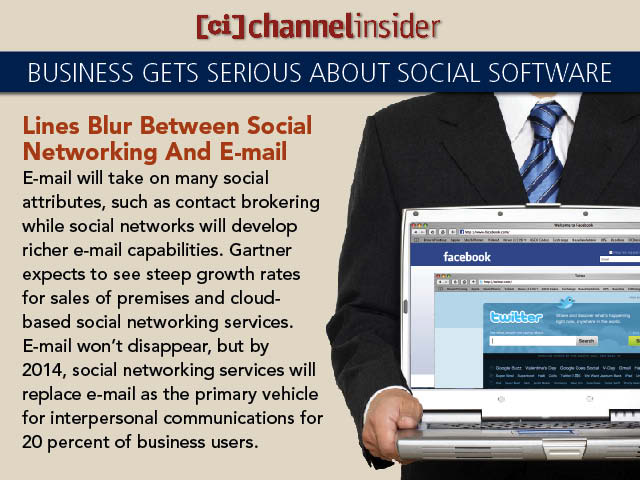 Businesses Get Serious About Social Software
Businesses Get Serious About Social Software
Lines Blur Between Social Networking And E-mail
E-mail will take on many social attributes, such as contact brokering while social networks will develop richer e-mail capabilities. Gartner expects to see steep growth rates for sales of premises and cloud-based social networking services. E-mail won’t disappear, but by 2014, social networking services will replace e-mail as the primary vehicle for interpersonal communications for 20 percent of business users.
 No Title
No Title
Microblogging Yes, Standalone Enterprise No
By 2012, more than half of enterprises will use activity streams that include microblogging, but stand-alone enterprise microblogging will have less than 5 percent penetration. Enterprise users want to use microblogging for many of the same reasons that consumers do to share quick insights, get quick answers to questions and so on.
 No Title
No Title
Business Versus IT-Driven Social Media
When it comes to collaboration, IT organizations are accustomed to providing a technology platform (such as, e-mail, IM, Web conferencing) rather than a social solution that targets specific business value. So where over 70 percent of IT-dominated social media initiatives will fail through 2012, half of business-led social media initiatives will succeed.
 No Title
No Title
New Skills Needed
Enterprises will need to develop new skill sets around designing and delivering social media solutions. A dearth of methods, technologies and tools will impede the design and delivery of social media solutions in the near term. But long term, enterprises will realize that social media is not a "hit or miss" activity naturally prone to high failure rates, and that a calculated approach to social media solution delivery must be an IT competency.
 No Title
No Title
Smartphones To Set The Standard
Within five years, 70 percent of collaboration and communications applications designed on PCs will be modeled after user experience lessons from smartphone collaboration applications. Gartner advises IT organizations to continue to procure leading-edge smartphones for testing and to accumulate knowledge on how the collaboration applications on such devices accomplish business tasks.
 No Title
No Title
Employee Trust And Buy-in Critical
Social network analysis is a useful methodology for examining the interaction patterns and information flows that occur among the people and groups in an organization, as well as among business partners and customers but users may resent this analysis. Gartner believes that through 2015, only 25 percent of enterprises will routinely utilize social network analysis to improve performance and productivity. Ground rules, employee trust and buy-in are critical for success.

